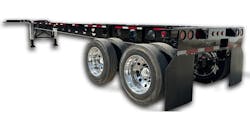Even before the official onset of this year’s winter, trucking companies are already dealing with snow and ice across a large section of the United States. Being prepared is a critical factor in dealing with winter road conditions.
To that point, Ryder System Inc, a leader in commercial fleet management and supply chain solutions, is sharing some best practices on winter operations. Proactive planning around fleet maintenance, proper fueling, driver training, and driver safety can help maintain fleet uptime and prevent unexpected breakdowns and accidents.
Useful information and resources for drivers and fleet managers are available now on Ryder’s Online Center for Winter Preparedness at www.campaigns.ryder.com/WinterDriving. The site will be updated throughout the season with weather advisories, emergency response protocols, tips, and advice.
“Last year’s polar vortex wreaked havoc on businesses that were not prepared for the impacts of extreme cold weather on their fleets,” said Mel Kirk, vice-president, Maintenance & Quality Operations, Ryder. “Ryder has the experience and expertise to help fleets prepare for and mitigate the impacts of extreme winter weather, to keep freight moving and drivers safe on the road.”
The following tips are essentials on Ryder’s winter driving preparedness list:
• Fleet maintenance proactive planning: An ounce of proactive prevention while temperatures are still mild will go a long way to ensure safety, reliability, and fewer unexpected issues when severe weather strikes. Doing things like replacing wiper blades with winter wiper blades and checking for proper tire inflation are examples of proper maintenance that are key for running an efficient fleet.
• Proper fueling: Making sure that fuel has been blended correctly for the seasonal temperature and that a cloud point additive is included prevents fuel filter waxing that causes breakdowns. For this reason, it is important that you consider the cold temperatures you may encounter in reaching your destination before hitting the road.
• Driver training: Drivers should be trained and well-informed about how to act in response to different situations. For example, in the event that a warning light turns on, such as the engine regeneration light, it is crucial that a driver know how to respond in order to ensure safety and maintain fleet uptime.
• Driver safety: Winter weather can add a lot of variables to driving conditions, but extra caution, alertness, and preparation can reduce the risk of possible collisions and/or mechanical failures. Simply increasing following distance or slowing down can ensure a safer trip.









